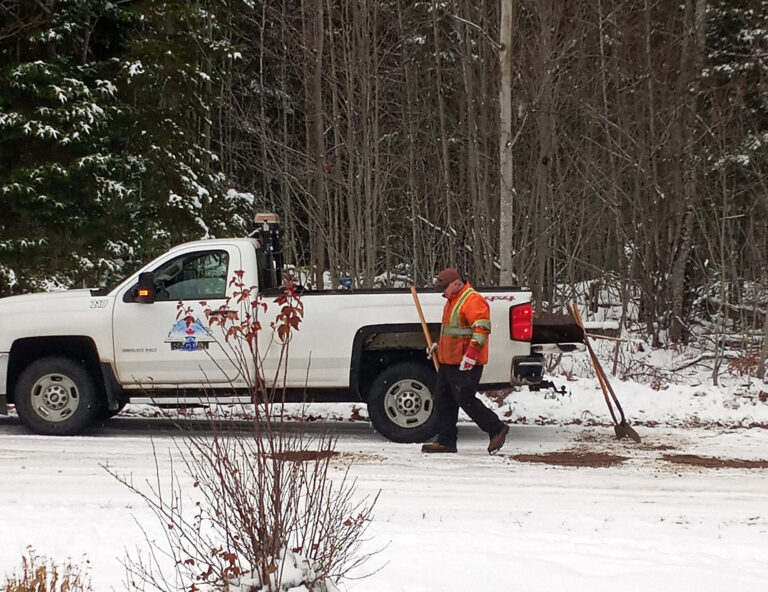
If you’re a patient living with an illness – especially a chronic one- or a caregiver or family member, finding out what services and supports are available, and understanding how to access them, can feel like a daunting task on top of an already difficult situation.
Recently, three members of the Patient, Family and Caregiver Network (PFaC) of the Ottawa Valley Ontario Valley Health Team (OVOHT) have been visiting local communities to help make that process a little easier. Their first presentation, held in Killaloe, aimed to give those in attendance a better understanding of what healthcare services exist and how to access them.
Bonny Johnson, a resident of La Passé who acts as co-chair of the PFaC Network, welcomed everyone to the session with a land acknowledgement.
Bonny explained that the OVOHT, launched in 2021, brings together more than 50 local healthcare organizations across Renfrew County.
“We work closely with all those organizations,” she said. “Many of us sit on different committees, so we have a voice in the planning and delivery of healthcare for
our area.”
The Value of Patient and Caregiver Voices
Alison Collins of North Algona/Wilberforce and also a PFaC member, assured attendees that when it comes to healthcare, “you are the experts.”
“Everyone here is a caregiver, family member, or patient,” she said. “And as you know, things change quickly in healthcare.”
She explained that PFaC members are all volunteers from across the Ottawa Valley who attend monthly meetings.
“We share and discuss our varied experiences at the table—some as caregivers, some as family members, and some as patients,” said Alison. “Our insights are then shared with the Ottawa Valley Ontario Health Team, with the goal of improving healthcare delivery and services throughout the region.”
Bonny then read attendees a scenario about an elderly couple – one partner beginning to show signs of dementia – and asked participants to think about what steps or resources they would recommend to help the couple. The discussion took place toward the end of the presentation.
Sharing Experiences to Help Others
Committee member Sheilagh Dunn shared that she joined PFaC after her husband was diagnosed with a rare form of ALS, hoping that their experience could help others in the county.
“Over time, I’ve learned what all the pieces of the healthcare system in Ontario are and how they fit together,” she said.
Bonny also encouraged those who don’t currently have a family physician or nurse practitioner to connect with Health Care Connect, a program that helps Ontarians without a primary care provider get added to a waiting list to be matched with one. Handouts were provided with contact information for the program.
Making Healthcare More Accessible
The presentation team acknowledged that healthcare jargon and acronyms can often feel overwhelming for most people, including themselves.
“We’re committed to keeping our own communication simple and easy to understand,” Sheilagh said. “For instance, ‘navigation’ isn’t a term most of us use every day—yet it’s used often. It simply means connecting the dots and helping people find resources that fit their situation.”
An additional speaker, Makayla Gendron of Community Services with Eganville Seniors and Navigator for OVOHT, then guided attendees through the website ottawavalleyhealthcareconnect.ca which connects users with healthcare information and local resources.
She also highlighted several key services available in Renfrew County, including:
– Health Connect Ontario (811): Provides access to a registered nurse 24/7 for advice.
– Renfrew County Virtual Triage & Assessment Centre (RC VTAC): If you have a health concern and do not have a family physician or nurse practitioner—or cannot access your regular primary care provider—call 1-844-727-6404 for support from medical receptionists, family physicians, and community paramedics, 24 hours a day, 7 days
a week.
– Renfrew County Community Paramedic Program: Offers home visits and remote monitoring.
– Renfrew County Mental Health and Addiction Services
– Home and Community Care Support Services
Practical Tips for Patients and Caregivers
During the presentation, three short information videos were shown. The first focused on practical tips for patients and caregivers, emphasizing how to prepare for and participate in healthcare decisions:
– Your first point of contact is often your family doctor or nurse practitioner who help coordinate diagnosis and care.
– If you’re a caregiver or power of attorney, ensure you have the patient’s consent so you can access health information and communicate on their behalf.
– Prepare questions in advance and request extra time for appointments if needed.
– Keep a notebook or folder with appointment notes, medications, and contact information.
– When facing a serious diagnosis, consider asking questions like: Is this condition curable? Will it be long-term or progressive? What can I expect over time? Is it life-threatening?
– Don’t hesitate to request a follow-up appointment if you need more time to absorb new information.
– Ask for clarification about medications, treatments, or care plans.
– Understand that your needs and supports may change over time – sharing that information helps tailor care to your values and circumstances.
MyChart: Your Health Information at Your Fingertips
The second video introduced MyChart, a secure online patient portal that allows individuals to access their health records electronically.
Alison explained that 10 healthcare organizations in Eastern Ontario (including St. Francis Memorial Hospital) currently use MyChart, with plans to expand to 16 organizations by fall 2026.
The platform allows patients to view test results, appointments, and reports, and shares their information with their care team, helping make healthcare more connected and transparent across the Ottawa Valley.
The third short video acknowledged the role of technology in healthcare. Bonny gave the example of many physicians now using artificial intelligence (AI) software during patient visits to transcribe conversations into notes, making documentation more accurate and allowing doctors to dedicate more time to their patients.
Bonny then guided attendees back to the earlier scenario of the elderly couple, and the group discussed possible resources that could help both the husband and wife.
In closing, she expressed that they hoped presentations like these will reinforce how important it is to ask questions about one’s own or loved ones’ healthcare. “It’s important that you understand what the healthcare plans are, what’s going on, and that you are not afraid to
ask questions.”
For more information about PFaC and the Ottawa Valley Ontario Health Team, contact Strategic Implementation Lead for OVOHT, Jama Watt, at info@ovoht.ca.





